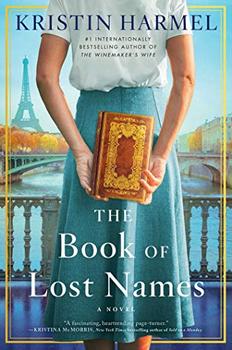Summary | Excerpt | Reading Guide | Discuss | Reviews | Beyond the Book | Readalikes | Genres & Themes | Author Bio

Chapter One
May 2005
It's a Saturday morning, and I'm midway through my shift at the Winter Park Public Library when I see it.
The book I last laid eyes on more than six decades ago.
The book I believed had vanished forever.
The book that meant everything to me.
It's staring out at me from a photograph in the New York Times, which someone has left open on the returns desk. The world goes silent as I reach for the newspaper, my hand trembling nearly as much as it did the last time I held the book. "It can't be," I whisper.
I gaze at the picture. A man in his seventies looks back at me, his snowy hair sparse and wispy, his eyes froglike behind bulbous glasses.
"Sixty Years After End of World War II, German Librarian Seeks to Reunite Looted Books with Rightful Owners," declares the headline, and I want to cry out to the man in the image that I am the rightful owner of the book he's holding, the faded leather-bound volume with the peeling bottom right corner and the gilded spine bearing the title Epitres et Evangiles. It belongs to me—and to Rémy, a man who died long ago, a man I vowed after the war to think of no more.
But he's been in my thoughts this week anyhow, despite my best efforts. Tomorrow, the eighth of May, the world will celebrate the sixtieth anniversary of Victory in Europe Day. It's impossible, with all the young newscasters speaking solemnly of the war as if they could conceivably understand it, not to think of Rémy, not to think of the time we spent together then, not to think of the people we saved and the way it all ended. Though my son tells me I'm blessed to have such a sharp mind in my old age, like many blessings this one is mixed.
Most days, I just long to forget.
I blink away the uninvited thoughts of Rémy and return my attention to the article. The man in the photo is Otto Kühn, a librarian from the Zentral- und Landesbibliothek in Berlin, who has made it his life's mission to return books looted by the Nazis. There are apparently more than a million such books in his library's collection alone, but the one he's holding in the photo—my book—is the one he says keeps him up at night.
"This religious text," Kühn has told the reporter, "is my favorite among the many mysteries that occupy our shelves. Published in Paris in 1732, it's a very rare book, but that's not what makes it extraordinary. It is unique because within it, we find an intriguing puzzle: some sort of code. To whom did it belong? What does the code mean? How did the Germans come to possess it during the war? These are the questions that haunt me."
I feel tears in my eyes, tears that have no place there. I wipe them away, angry at myself for still being so emotional after all these years. "How nice it must be," I say softly to Kühn's picture, "to be haunted by questions rather than ghosts."
"Um, Mrs. Abrams? Are you talking to that newspaper?"
I'm jolted out of the fog of my memory by the voice of Jenny Fish, the library's assistant manager. She's the type who complains about everything—and who seems to enjoy suggesting at every opportunity that since I'm eighty-six, I might want to think about retiring soon. She is always eyeing me suspiciously, as if she simply cannot believe that at my age, I'd still want to work here.
She doesn't understand what it means to love books so passionately that you would die without them, that you would simply stop breathing, stop existing. It is quite beyond me, in fact, why she became a librarian in the first place.
"Yes, Jenny, indeed I am," I reply, without looking up.
"Yes, well, you probably shouldn't be doing that in front of library guests." She says it without a trace of irony. "They might think you're senile." She does not have a sense of humor.
Excerpted from The Book of Lost Names by Kristin Harmel. Copyright © 2020 by Kristin Harmel. Excerpted by permission of Gallery Books. All rights reserved. No part of this excerpt may be reproduced or reprinted without permission in writing from the publisher.




Being slightly paranoid is like being slightly pregnant – it tends to get worse.
Click Here to find out who said this, as well as discovering other famous literary quotes!
Your guide toexceptional books
BookBrowse seeks out and recommends the best in contemporary fiction and nonfiction—books that not only engage and entertain but also deepen our understanding of ourselves and the world around us.